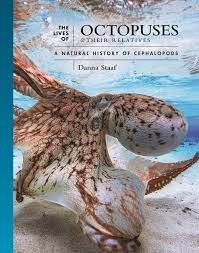The Lives of Octopuses & Their Relatives by Danna Staaf
/The Lives of Octopuses & Their Relatives: A Natural History of Cephalopods
By Danna Staaf
Princeton University Press, 2023
The “Lives of the Natural World” series from Princeton University Press continues with this oversized, colorful entry, The Lives of Octopuses & Their Relatives: A Natural History of Cephalopods by science writer (and author of the wonderful Squid Empire: The Rise and Fall of the Cephalopods) Dianna Staaf, who seeks in these pages to present “the mystery, wonder, and downright weirdness” of cephalopods all over the world.
Princeton University Press is by now comfortably expert in making productions like these both beautiful and inviting, and this volume is not exception: these pages feature a parade of bizarre, lovely, almost otherworldly creatures, all caught in full color, with accompanying brisk blocks of information about their size and distribution (typically hugging the coasts). We meet the Pacific Red Octopus, about which we’re told:
Pretty much anything that you might think of as a typical octopus trait applies to the Pacific Red Octopus. They are speedy changers of skin color and texture, and voracious predators of all kinds of shellfish from scallops to crabs. They reproduce once at the end of their lives, and their many tiny eggs hatch into planktonic paralarvae that drift with the currents before growing large enough to settle back down to the rocks.
We meet the Football Octopus, a pelagic species whose females are ten times bigger than the males. We meet the Ornate Octopus (Callistoctopus ornatus), a fervent cannibal even in a family of cannibals. We meet the Southern Bottletail Squid (Sepiadarium austrinum), whose speciality is covering itself (and filling itself) with a distinctly unsavory goo. “As you might imagine,” Staaf deadpans, “a predator looking for a mouthful of cephalopod and finding itself instead with many mouthfuls of slime is not likely to target that particular cephalopod again.”
And through it all, Staaf consistently reminds her readers that as strange as these weird being are, they aren’t as alien as they seem at first. “We all carry a legacy of salt water in our cells,” she writes. “The fluids in our bodies are salty; not only our tears and blood but the liquid inside and between our cells.”
The Lives of Octopuses & Their Relatives is endlessly fascinating, as these brilliant books from Princeton always are, but this one has the added thrill of often feeling like science fiction.
Steve Donoghue is a founding editor of Open Letters Monthly. His book criticism has appeared in The Washington Post, The American Conservative, The Spectator, The Wall Street Journal, The National, and the Daily Star. He writes regularly for The Boston Globe, the Vineyard Gazette, and the Christian Science Monitor and is the Books editor of Georgia’s Big Canoe News.
